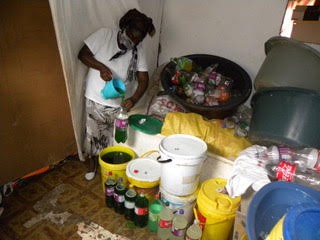Covid-19: Informal traders quietly defy ban on door-to-door selling
“I can’t sit at home while my family is starving”
A trader pours detergent into bottles in her house for sale in Nelson Mandela Bay townships. Photo: Joseph Chirume
Informal traders in Nelson Mandela Bay are trying to find a way to survive by quietly going door-to-door selling goods in spite of lockdown rules.
Municipal spokesperson Mtubanzi Mniki said only informal traders who had permits before the lockdown and who sold uncooked food, could be granted Covid-19 trading permits. He said permits are not issued to informal traders selling goods house to house as this would be in direct contravention of current lockdown regulations.
One trader buys blankets in Johannesburg for resale in Motherwell. He goes door-to-door and gives customers three months to pay. He has been in the business for 15 years and usually would do brisk sales with the approach of winter, he says. To get round the prohibition on door-to-door selling during lockdown, he goes round with only a brochure. “If I get an order I go back home to collect one blanket at a time.”
He says police are on the watch and there are roadblocks, but “as traders we have to feed our families without spreading the disease. I practice safe social distancing and I always wear my mask when in public. I can’t sit at home while my family is starving … There is no money to buy food and we don’t have cash to pay for our rent.”
Another trader who raises and sells chickens in Kirkwood says he used to sell the chickens from a trailer at shopping malls. Now he advertises on WhatsApp or Facebook. “Clients only come to my house to collect their chicken or I deliver one at a time to their houses,” he said.
A trader from Walmer says she used to buy brooms, mops and other items in Johannesburg for resale in the various townships of Port Elizabeth.
Now she and her friends are buying dishwashing chemicals and hand sanitisers from a factory in Nelson Mandela Bay.
She packs the detergents at her house into two-litre plastic containers and delivers the bottles one by one to her clients. She charges R40 per bottle.
“I have a database of all my clients. I phone them for orders.
“I cannot carry more than one bottle. If the police find me with more than one bottle I will be in trouble.”
“I practice good social distancing and I travel with two masks and a small bottle of sanitiser. “
“But I couldn’t just sit and wait till the government lifts the ban on non-essential goods.
Police spokesperson Captain Andre Beetge said, “We enforce the regulations on lockdown and people should only go out of their houses when doing essential shopping and to seek medication.”
Next: Covid-19 pandemic leaves immigrants desperate for assistance
Previous: Low-income families are spending more on food since March, says report
© 2020 GroundUp.
This article is licensed under a Creative Commons Attribution-NoDerivatives 4.0 International License.
You may republish this article, so long as you credit the authors and GroundUp, and do not change the text. Please include a link back to the original article.



